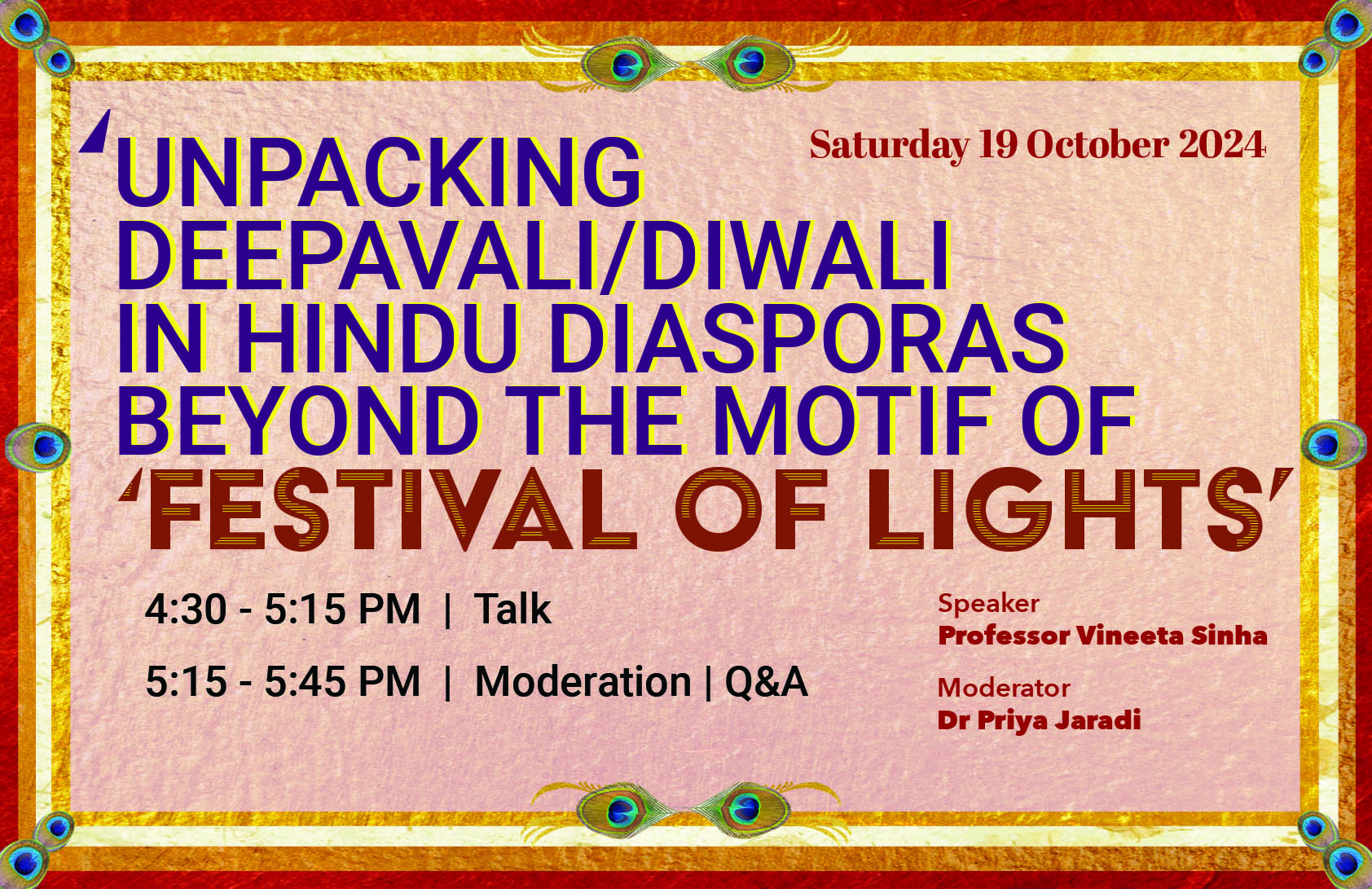
‘Unpacking Deepavali/Diwali in Hindu Diasporas beyond the motif of ‘Festival of Lights’
This brief talk unpacks the complex and multiple meanings of “Deepavali”/ “Diwali”, approached typically as the “Festival of Lights” and observed across India and amongst ‘old’ and ‘new’ Hindu diasporas globally. Traced to Sanskrit linguistic roots, ‘deep’ and ‘diyam’ refer to ‘light’ or ‘lamp’, and the terms ‘Deepavali’ and ’Diwali’ are translated literally as ‘row of lights’. These diverse celebrations, symbolising the triumph of light over darkness, good over evil, are supported by historical stories and customary practices relating to the reverence of departed ancestors, and grounded in mythologies centring on life episodes of the Hindu deities Rama, Krishna and Lakshmi. Assuming a historical perspective and foregrounding the manifold cultural and religious enactments of Deepavali in Hindu diasporic sites, I highlight how this festival has on occasion also been politicised and entangled with regional, linguistic, caste-based and political debates. These included assertions of Deepavali as a ‘Hindu’ festival, its ‘universality’ and its status as a ‘representative’ day/ public holiday for all Hindus – ideas which were contested at specific historical junctures. Despite generating controversies, the festival has traction in the present and shows the capacity to morph and mould itself – finding new resting points.
SPEAKER | Vineeta Sinha
Vineeta Sinha is Professor at the Department of Sociology and Anthropology at the National University of Singapore (NUS). Her research interests include Hindu religiosity in the Diaspora, religion, commodification and consumption processes, religion and materiality, religion-state encounters in colonial and post-colonial moments, Eurocentric and Androcentric critique of classical sociological and anthropological canons, decolonizing knowledge production and critical pedagogy.
Her publications include the following monographs: A New God in the Diaspora? Muneeswaran Worship in Contemporary Singapore (2005, NUS Press and NIAS); Religion and Commodification: Merchandising Diasporic Hinduism (2010, Routledge); Religion-State Encounters in Hindu Domains: From the Straits Settlements to Singapore (2011, Springer); Sociological Theory Beyond the Canon (co-authored with Syed Farid Alatas, 2017, Palgrave-Macmillan), Southeast Asian Anthropologies (Co-edited with Eric Thompson, 2019, NUS Press) and Temple Tracks: Labour, Piety and Railway Construction in Asia (2023, Berghahn Books).
She is Editorial Board Member of Current Sociology and International Advisory Board Member of Decolonization and Social World Book Series (Bristol University Press).
MODERATOR | Priya Jaradi
Priya Jaradi is Convenor of the Art History Minor, a collaboration between National University of Singapore (NUS), the National Gallery Singapore, and the Singapore Art Museum. Jaradi served as assistant curator (South Asia) at the Asian Civilisations Museum (2005-2007). Her publications include Fashioning a National Art: Baroda’s Royal Collection and Institutions (1875-1924), (2016, Oxford University Press), Baroda: A Cosmopolitan Provenance in Transition, (2015, Marg Foundation), and Transcultural Imaginations: Revisiting the 1959 Donation from the Government of India to Malaya (2024, NUS Museum). Her ongoing research uncovers the contributions of collections, curricula, and pedagogies to revisionist art histories and historiographies of South and Southeast Asia, particularly, India and Singapore.


